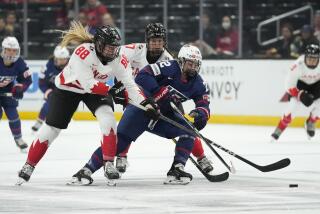NHL Lockout Puts College Hockey in Spotlight
- Share via
DENVER — The coach draped his hand over the wooden lectern, then with a conspicuous tap -- or two or three -- made sure everybody noticed what he was wearing on his right hand: A big, diamond-encrusted national-championship ring.
Yes, winning has its rewards. And yes, these are good times to be part of the Denver University hockey team -- or any college hockey team, for that matter.
Long played under the radar, especially in big-time pro sports towns like Denver, college hockey is enjoying a coming-out of sorts this fall, thanks largely to the NHL lockout that has transformed the college game into the only game in town.
DU got doubly lucky, because it has the city’s undivided hockey attention in this, the season after its first national championship since 1969.
“There’s no question, as we all know, this has had a positive effect on our hockey program,” Pioneers coach George Gwozdecky said. “There’s more attention from our local media, a huge bounce in season-ticket sales, all kinds of other things.”
There’s been a 36 percent increase in season-ticket sales from last year to this. Marketing director David Madsen said 28 percent of the gains came in the summer, while the glow of the national championship was still bright. Most of the rest coincided with Sept. 15, the week of the NHL lockout.
That week also brought about something few ever thought they’d see -- a handful of players from the Colorado Avalanche working out with the college guys at DU. The Pioneers may not have been the kind of sparring partners the Avs are used to, but with the lockout on, their choices were limited.
“You’re not going to find the [NHL] level anywhere, even if you go to Europe,” Avs forward Steve Konowalchuk told the Denver Post after one of the workouts.
While nobody would deny the talent disparity between college and the NHL, the college game tries to make up for it in a few different ways.
First, there’s the general lack of enforcement of the two-line offsides pass, a rule that loosens up play and allows more opportunities for long passes that lead to good scoring opportunities. It also addresses one of the biggest complaints about the NHL -- that it’s too tight checking and too much energy is spent between the blue lines instead of on offense.
Another difference is fighting, or lack thereof. Although many will debate whether this is a good thing, it’s hardly ever seen in college because of the stringent penalties. Players are suspended for one game for their first fight, two for their next, and so on.
And that leads to the next issue -- fewer games. Compared to 84 regular-season games in the NHL, DU will play only 28 games in the Western Collegiate Hockey Association (WCHA), most of them on Friday and Saturday nights, all of them very meaningful.
“In a sense, it’s like a college football atmosphere,” Gwozdecky said. “Everybody gears up for the weekend, only we’ve got two games instead of just one.”
Finally, there’s the price element. While Avalanche tickets in the lower bowl go for between $99 and $224, the most expensive ticket for a DU game is $35. Even with the $1,400 donation DU gets to join its “Gold Club” level, four season tickets for the Pioneers in the lower section go for around $2,800, which would get four people good seats for seven Avalanche games.
Of course, getting season tickets for a DU game isn’t easy anymore. Madsen said only 17 remained as of Wednesday, 16 days before the Denver’s home opener against St. Cloud State.
More to Read
Go beyond the scoreboard
Get the latest on L.A.'s teams in the daily Sports Report newsletter.
You may occasionally receive promotional content from the Los Angeles Times.






